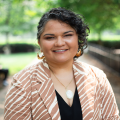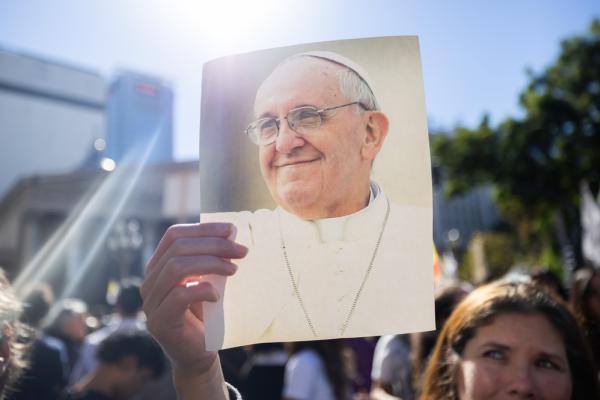Costa Rican-American writer John Manuel Arias often says that he lived in San José, Costa Rica with his grandma and four ghosts.
When he shares this fact with Latine folks, he is typically met with curiosity: What are the ghosts’ names? How do they communicate with you? Did they follow you to the U.S.? It is a common understanding in many Latin American Indigenous cultures that the veil between the living and the dead is thin, and relating with our ancestors can be an everyday occurrence. Scriptures that speak of the clouds of witnesses surrounding those who follow Jesus resonate strongly with many Latine folks. We know that those who have endured the race set before them still encourage us today. We think of Jesus on a mountain conviviendo and communing with Moses and Elijah before his three disciples as an experience that can be part of our reality too (Luke 9:30-36). We may not call them ghosts, but we recognize our ancestors are still with us.
Many Latines living in this country have adopted a form of white, Western Christianity that has come at a great cost to our cultural identity, our communal connection, and our sense of belonging. We’ve faced the tension of embracing a faith marked by discourses that demonize Indigenous, Afrolatine, and mestizo wisdom and spiritual practices. In trying to live out our new faith values, we wrestle with continuing to trust the goodness of the traditions and saberes in which we were raised. If we have internalized the air of superiority that white, Western Christianity breathes, we are at risk of losing the very wisdom that allowed our people to resist the dagger of colonization. But our bodies, our hearts, and our communities often clamor to remember, and they will not go silent. We remember this wisdom when we slow down and sit under the moonlight. We remember it by extending the time we spend in sobremesa with our elders and cousins, sharing stories and laughing together. We do this by taking baños with herbs that heal us. We embrace this wisdom when we connect with others who are doing the same.
The first time I came across Methodist liberation theologian Elsa Támez was in Through Her Eyes: Women’s Theology from Latin America, a collection of essays she edited. In the introduction, Támez reclaims the Indigenous story of Chimalman, a Mexica goddess who counters male colonial violence in nonviolent ways. Chimalman grabs the weapons used against her, drops them down, and bares herself before a violent ruler. Her courageous act shakes the ruler and stops his conquest. Támez equates the task of Latin American women theologians to that of Chimalman. In a male-dominated theological world, Latin American women theologians must grab the violence thrown at us and magnificently bare ourselves in ways that invite the conversion of male colonial thinking. I grew up learning the stories of Chimalman and other powerful women in Mexica or Aztec mythology, but Támez’s text was the first time I read someone who was drawing wisdom from our shared cultural ancestral stories to engage with the white, Western Christian discourse — discourse that had called us to forget Chimalman and her powers.
Tired of Western expressions of Christianity that are ahistorical, deeply individualistic, and private, we long for cosmologies that integrate the pieces within us. Colonial approaches to the Christian faith force conversion and dehumanize those with different faith practices or beliefs. Colonial approaches to Christian faith disconnect us from our intuition. They disconnect our body from our heart and mind and overvalue the mind. Instead, our traditions are embodied. La mente, el corazón y el cuerpo must know God. We feel God. We hear God in our intuition. Many of us who came to faith in evangelical traditions were told not to depend on our feelings, but to trust the word of God as fact and to believe that our feelings were not reliable. In doing so, we learned to mistrust our intuition. While it’s true that God speaks through scriptures, and that we can draw inspiration and strength through the witness of generations wrestling with God and their faith, God has also deposited unique wisdom within each of us. We carry generations of divine wisdom. This wisdom gives us clues to survive and thrive. When we ignore our intuition, we are suppressing the divine wisdom God has deposited within each of us. Our intuition is an integral part of knowing God and experiencing the world.
Communing with the elements is also a reliable way of knowing God. God is in the wind and the water. We remember how Elijah encountered God in the stillness of a gentle breeze. He wrapped his cloak around his body and stood at the entrance of a cave to commune with God and receive guidance (1 Kings 19:11-13). The scene reminds me of my mom. She wrapped her rebozo around her and looked out the window onto the ravine that grew behind our house, as if waiting for guidance. It reminds me of my grandma Lupita too. She kept watch at night, looking out the window onto the street. God guides us in the silence of hearing ourselves, observing what is happening, and waiting for God’s soft voice.
The pandemic, the looming climate crisis, and a general disappointment with traditional Western Christianity and the state of justice in this country has led a new generation of Latine to honor their Indigenous roots through spirituality. For many Latines who, like me, live in the diaspora or were born in this land, the calling to re-indigenize our faith is not a rejection of our Christian roots. Rather, it is a yearning for a fuller expression of Christianity that honors our rich spiritual and cultural heritages. We showcase the magnificence of Creator God when we honor the multiplicity of experiences and frameworks that are possible in the practice of faith.
Editor’s note: In accordance with the author’s preferences, we have not italicized words in Spanish. For an example of why some Latine authors prefer not to italicize Spanish words in their English writing, click here. This article was corrected on Nov. 13, 2023 to reflect that Elsa Támez reclaims an Indigenous story in the introduction to Through Her Eyes: Women’s Theology from Latin America, but the whole collection of essays speaks to broader themes in Latin American theology.
Got something to say about what you're reading? We value your feedback!







